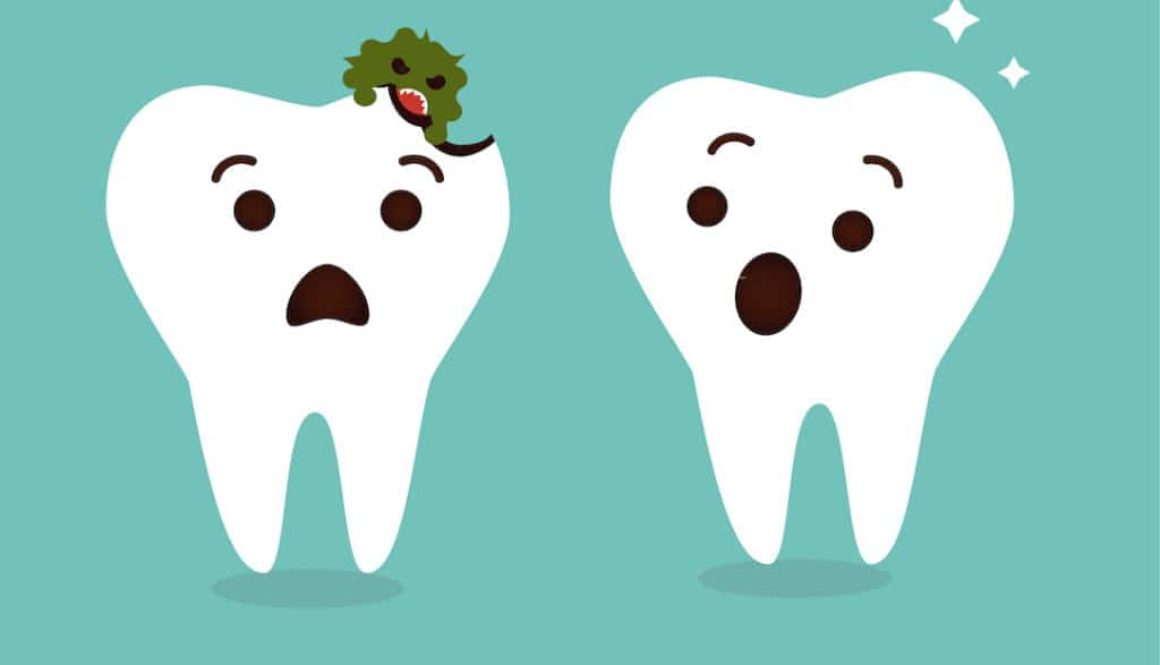How to Prevent Cavities
When we were little, we often heard the adults in our lives telling us that eating too many sweets would cause cavities in our teeth — but is that true? In this article we’re discussing just what causes cavities and what you can do to prevent them from happening within your mouth.
What are Cavities?
Tooth decay, also known as cavities, is the destruction of your tooth enamel (the outer, hard layer of your teeth). We constantly have plaque, a sticky film of bacteria, forming on our teeth. When we eat and drink foods that have sugars, the bacteria in plaque keeps these acids in contact with your teeth and can cause the enamel to break down. MouthHealthy, a blog by the American Dental Association, explains that this is when cavities can form. Cavities are tiny holes in your teeth. Common signs of cavities include:
- Toothaches
- Tooth sensitivity
- Mild to sharp pain when eating or drinking something sweet, hot, or cold
- Visible holes or pits in your teeth
- Brown, black, or white staining on the tooth’s surface
- Pain when you eat
Do Only Children Get Cavities?
People often think that only children are at risk for cavities, but the truth of the matter is that people of all ages are at risk for developing a cavity. While it is more common in children and teenagers, cavities can affect adults and even infants, too.
Does Sugar Cause Cavities?
Another myth that many people grow up believing is that sugar is the cause of cavities. However, this isn’t true. Rather, cavities are caused due to bacteria and acid in our mouths. Bacteria thrives on sugar, so when we do eat sweet foods, we give the bacteria in our mouth something to feed on. This bacteria then creates an acid that begins to destroy the enamel, which results in a cavity forming. While sugar can kick off this vicious cycle, it’s not the direct cause of a cavity forming.
How to Prevent Cavities
One reason that adults don’t get as many cavities as children is because adults know how to better clean their teeth with proper brushing and flossing. However, especially if you’re a caregiver, a refresher is good from time to time to make sure that you’re following a good dental hygiene routine. Parents.com explains a good road map to refer to that will not only protect your child’s smile, but yours too!
- Curb your sweet tooth. As we mentioned above, sugar isn’t the direct cause of tooth decay. However, since bacteria thrive on sugar, it’s important to tame your sweet tooth. In fact, it’s not even how much sugar you eat, but how often you eat it. For example, you can eat a candy bar all at once and that will be far less harmful to your smile than slowly snacking on it over the course of the day. Why is this? This is because repeatedly exposing your teeth to sugar prevents saliva from doing what it’s supposed to do — naturally cleaning your teeth.
- Avoid sugar-filled drinks. Even things like fruit juice, breast milk, and formula are culprits here. A common condition we see in babies is known as “baby bottle tooth decay.” This is when the teeth become decayed in children who frequently sip on milk or juice, especially when given these in bottles overnight. As they sip during the night, it allows the sugar to sit on their teeth for long periods of time.
- Use fluoride. Ask your dentist if your community tap water has been fluoridated. If not, be sure you’re using a fluoride toothpaste. For your children, don’t begin using fluoride until they are old enough to spit it out rather than swallowing it. Now, dentists can apply a safe and protective fluoride varnish to your child’s teeth to help prevent decay. Fluoride is from a mineral found in nature and is a great way to protect your teeth from cavities.
- Care for your own smile. As a parent, if you have a history of dental problems, refrain from sharing utensils or toothbrushes with your baby or toddler. What many people don’t realize is that you can pass cavities on to your children by simply taking a bite off the same spoon your child is using. If you do have dental issues, talk with your dentist about using an antibacterial mouthwash to reduce your chance of passing along bacteria to your children.
Make an Appointment with Young Family Dental
The longer you put off treatment for cavities the more likely you are to experience severe dental health issues, like tooth loss. If you are noticing signs of cavities in you or your children, make an appointment with Young Family Dental today. With five convenient locations right here in Utah, we’re here for you.




